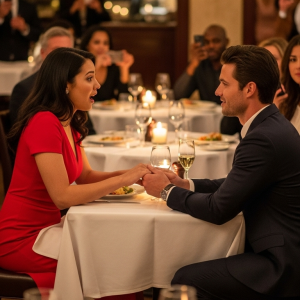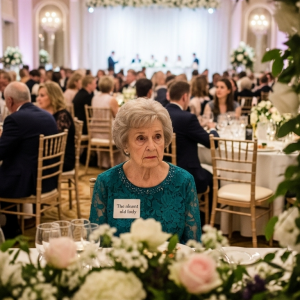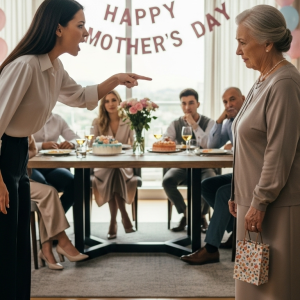For our third wedding anniversary, I decided to do something special. My husband, Arthur, had been distant lately—not mean, just… elsewhere. Constantly on his phone, a vague, moody presence in the apartment we shared. When I asked what he wanted to do, he just shrugged. “Whatever you want,” he’d said, his eyes already drifting back to his screen.
So, I planned to recreate his favorite childhood meal. I even texted his mother for the recipe, a decision I would come to regret. I spent the entire afternoon cooking, bought the expensive ingredients, set the table with the wedding-gift candles, and put on a playlist of songs from when we were first dating. I was trying to remind us of the people we used to be.
An hour before he was due home, he texted: “Mom and Uncle Randy are coming over. Forgot to mention it.”
My heart sank. Our anniversary dinner? I texted back, “Lol, what?” His reply was dismissive. “They’ll be quick. Mom wanted to see the apartment.” I should have canceled everything right then, but I was too invested. I told myself it would be fine. They would leave, and the night would still be ours.
They arrived, and the atmosphere immediately curdled. His mother began a silent inspection of our home, running a finger along the countertops and peering into the fridge, her expression a mask of polite disappointment. His Uncle Randy, already smelling of whiskey, made a loud joke about the “fancy setup.” Arthur barely said hello before disappearing to change.
I served the meal, trying to force a cheerful conversation, but it was like talking to a wall. His mother questioned every ingredient I’d used. Arthur sat scrolling on his phone until I nudged him under the table. He sighed, put it down, and took a single, deliberate bite of the food I had spent all day preparing.
Then, he stopped chewing, looked at me, then at his mother, and spat the food into his napkin. Not discreetly. He made a show of it, like a toddler rejecting vegetables. Randy burst out laughing. His mother just looked mortified—not for me, but for him.
“Is something wrong?” I asked, my voice barely a whisper.
Arthur slammed his fork down. “Maybe if you listened to my mom more, you’d know how to cook a simple meal,” he snapped. His voice was cold, sharp, and loud. “Now I see why she begged me not to marry you. You’re useless in every way.”
The room went silent. Randy let out another drunken chuckle. “Should have married someone who could at least fake being a real woman, Art,” he slurred.
I just stared at Arthur, the man I had loved for six years. He wouldn’t meet my eyes. His mother just pursed her lips, a silent, damning verdict.
I didn’t yell. I didn’t throw anything. I looked directly at him and said, “You just buried this marriage with your own mouth. Remember that.” Then I stood up, grabbed my phone, and walked out. I slammed the door behind me and didn’t look back.
I went to my sister Jessica’s apartment that night. I didn’t cry. I just sat on her couch, numb, while my phone lit up with texts from Arthur—first demanding I come back, then accusing me of overreacting. I stayed the night, listening to the city sounds outside, feeling utterly and completely alone.
The next morning, a new text arrived. “Mom is upset. I was tired, I didn’t mean it. But you never listen. You always make things harder than they need to be.” The apology, twisted into an accusation, was more insulting than the original offense.
I went back to our apartment that afternoon to get some things. He was there, waiting, and tried to act as if nothing had happened. “We can just forget about last night,” he said, a casual dismissal of my pain. “Let’s just move on.”
I stared at him, speechless. He actually expected me to apologize, to smooth things over for his comfort. I didn’t say a word. I just walked past him, grabbed a bag of clothes, and left again. As I walked out, I heard him mutter, “She’s right. I never should have expected you to change.”
For the next few days, I crashed on Jessica’s couch. The texts from Arthur kept coming, a bizarre mix of half-hearted apologies and thinly veiled blame. His mother texted me once, a condescending message about how marriage is “hard work” and that I should try harder to make Arthur happy. I didn’t reply. It only fueled the cold, hard anger that was beginning to replace my shock.
I knew I had to go back for the rest of my things. I texted Arthur to let him know I’d be by while he was at work. That’s when his mom texted me directly. “I will be there as well. We need to discuss this as a family.” I didn’t respond.
Jessica insisted on coming with me. When we walked in, Arthur’s mom was already there, sitting on the couch like a queen holding court. Arthur stood by the kitchen, arms crossed, refusing to look at me. It was an ambush.
His mother started with a soft, condescending tone, speaking of forgiveness and family duty. Then came the demand. “Maybe you could apologize for storming out,” she said. “You embarrassed Arthur in front of his family.”
I looked from her to my silent, cowardly husband. “He spat my food out and called me useless,” I said, my voice shaking with rage. “Randy called me ‘not a real woman.’ And you want me to apologize for leaving?”
She ignored the question. “You’re married. You made vows. A good wife makes sacrifices.”
“I have made enough sacrifices,” I shot back, finally finding my voice. “I have spent years making myself smaller so you all could be comfortable. I’m done. You raised him to think women should just take it, and I’m not built that way.”
I started packing, grabbing everything that was mine. My plants, my books, the kitchen gadgets I’d paid for, even the good blanket she’d given us that she always called “family property.” I took it just to be petty.
Arthur finally spoke. “You’re really leaving over this?” he asked, as if he genuinely couldn’t understand.
“Yes,” I said, slamming a drawer shut. “I am.”
His mother followed me out to the car, her voice rising with frantic accusations. “You’re overreacting! You’re breaking his heart!”
She raised her hand as if to slap me, but Jessica stepped between us, shoving her back. Arthur ran over, yelling at my sister. “You should have been protecting me from them!” Jessica yelled back, and in that moment, I knew she was right. I got in the car and we drove away, and for the first time in days, I laughed. It was a wild, broken sound, but it was a start.
The story spread quickly. Arthur told our mutual friends that I had “flipped out over nothing.” I told the truth. Some believed him, some believed me. An old friend, Nancy, who was truly neutral, invited us both to her birthday party, hoping we could be civil. I agreed to go, but with an exit plan.
The party was tense. Arthur held court with his friends, laughing too loudly, performing for an audience. He and Randy, who had shown up uninvited, cornered me in the hallway. “So, you’re just going to make me look like the bad guy in front of everyone?” Arthur demanded.
I’d had enough. I walked into the living room, where he was spinning his tale of a “sensitive” wife and a “joke” gone wrong.
“You want to tell everyone what really happened, Arthur?” I announced to the silent room. “You want to talk about spitting out the anniversary dinner I made for you? About calling me useless in front of your family? Is that the joke?”
The room went dead silent. Arthur stammered, trying to claim I was twisting things.
“Maybe if you’d listened to me once in six years instead of your mom and your drunk uncle, you’d still have a wife,” I said, looking him dead in the eye. I grabbed my bag and walked out. He followed me to the sidewalk, trying to grab my arm, his face contorted with rage. “You’re making a huge mistake,” he seethed.
“No,” I said, pulling away. “You already made it for me.”
In the weeks that followed, Arthur’s desperation grew. He posted long, vague rants on social media about loyalty and sacrifice. His mom called my mom, claiming I had “broken Arthur’s spirit.” He even showed up at Jessica’s apartment, trying to force his way in, claiming I was throwing everything away over “one bad night.”
Each action only solidified my resolve. I hired a lawyer. I found a new apartment. I began the slow, tedious process of untangling my life from his.
The last time I went back to the apartment was to drop off my keys. It already felt like a stranger’s home. I left his mail on the counter, took the last of my things, and placed a manila envelope in the center of the kitchen table. Inside were the signed divorce papers. On top, I left a sticky note. “You buried this marriage with your own mouth. Remember that.”
The calls started that afternoon—missed calls, angry voicemails, whiny texts. I deleted them all. I blocked his number, his mother’s, his cousin’s. I severed every tie. His final, desperate act was to send a mutual friend to mediate, to tell me Arthur was a “mess” and that I had “ruined the family.”
I just laughed. The girl who would have been crippled by that guilt was gone. She had walked out of that anniversary dinner and never looked back. I may have been living out of boxes, but I was free. He wanted me to know my place. I finally realized my place was anywhere he wasn’t.
The days after the party at Nancy’s were a strange mix of liberating and terrifying. The supportive texts from friends who finally understood were a balm on my wounded pride. But the practicalities of dismantling a six-year relationship were daunting. I was living out of a suitcase in Jessica’s spare room, surrounded by the sad, haphazard collection of things I’d managed to grab.
My first call was to a lawyer. She was a no-nonsense woman named Carol who listened to my story without a flicker of surprise. “This is an emotional wound,” she said, her voice firm but kind. “But divorce is a business transaction. We need to focus on separating your assets cleanly.”
That’s when the first red flag appeared. Arthur refused to provide his financial statements. He claimed through his lawyer that he was “gathering the necessary documents,” but weeks went by. Carol advised me to start untangling our joint accounts on my own.
I spent a weekend hunched over my laptop, fueled by coffee and righteous anger. Our joint savings account, which I thought was for a future down payment on a house, was the most alarming. There were dozens of small, odd withdrawals. ATM fees from casinos in neighboring states. Small, repeated payments to online betting sites. Money transfers to names I didn’t recognize. It wasn’t a huge amount, but it was a steady drain, a secret leakage I had been completely oblivious to.
I felt a chill run down my spine. The image of Arthur, constantly moody and “checked out,” suddenly snapped into focus. His stress, his secrecy—I had assumed it was work. Now, I wasn’t so sure. I had been so focused on the emotional betrayal that I hadn’t even considered there might be a financial one, too.
A month after the anniversary dinner, I got a text from a number I didn’t recognize. “Alicia, it’s Joel. Can we talk? It’s important. I promise this isn’t a trick.”
I hesitated. Joel, Arthur’s brother, had been conspicuously silent through all of this. But something in the message felt genuine. I agreed to meet him for coffee at a neutral place halfway between our neighborhoods.
He looked terrible, his face pale and drawn. He apologized profusely for what had happened at the dinner, for his uncle’s behavior, for not speaking up sooner. “I’m so sorry, Alicia. My family… they’ve enabled him for his whole life. Especially my mom. But what he did to you was unforgivable.”
He took a deep breath and looked me in the eye. “There’s something you need to know. Arthur’s stress… it’s not about his job.” He paused, struggling with the words. “He doesn’t have a job. He was laid off six months ago.”
The coffee cup in my hand felt suddenly heavy. Six months. He had been pretending to go to work every day for half a year. The late nights, the “work trips,” the constant complaints about his boss—it was all an elaborate lie.
Joel explained that Arthur had been too ashamed to tell anyone, especially his mother, who equated a man’s worth with his career. He’d been borrowing money from friends, racking up debt, and trying to maintain the illusion of success. The “weekend trip with college friends” that had caused our minor fight in January? It was a desperate trip to ask an old roommate for a loan.
“He was drowning,” Joel said, his voice cracking. “And instead of asking for help, he chose you as a scapegoat. It’s what he’s always done.”
That revelation was the key that unlocked everything. With this new information, my lawyer subpoenaed Arthur’s personal bank records. The truth was a catastrophe.
It wasn’t just small bets. Arthur was in the grips of a serious gambling problem. He had tens of thousands of dollars in debt to online casinos and high-interest payday lenders. The joint savings account had been his personal ATM.
Worse, Carol discovered a loan for $20,000 taken out in both of our names three months prior. He had used an e-signature service to forge my consent on the application. The money was already gone, lost in a series of failed bets.
Suddenly, the cruelty of that night made a sickening kind of sense. His rage wasn’t a spontaneous snap. It was a calculated detonation. He was about to be exposed, his perfect life was imploding, and he needed someone to blame. He didn’t just want to break up with me; he needed to obliterate my credibility, to paint me as the unstable, irrational one so that when the financial truth came out, he could claim I was part of the problem. He spat out my food because he was spitting out the poison of his own failure and trying to splash it onto me.
I felt a cold, hard clarity. This was no longer just a divorce. This was a fraud case.
Our first and only mediation session was in a sterile conference room with bad art on the walls. Arthur walked in with his lawyer, looking haggard but still defiant. He clearly expected to argue about who got the couch and the wedding china.
He was not prepared for what happened next.
My lawyer, Carol, didn’t start with assets. She started with debt. She laid out the printouts one by one: the gambling site transactions, the secret credit card statements, and finally, the forged $20,000 loan document.
“My client is prepared to file a criminal complaint for felony fraud and identity theft,” Carol said, her voice calm and even. “However, she is willing to forgo that, and the public trial that would accompany it, under a few specific conditions.”
Arthur looked like he had been physically struck. His face went white, then a blotchy red. He looked at me, his eyes wide with panic, finally seeing me not as his emotional punching bag, but as the person holding the switch to the rest of his life.
I didn’t feel anger anymore. I didn’t feel sadness. I felt nothing but a profound sense of finality. This was the last time I would ever have to deal with his chaos.
Carol laid out my terms. Arthur would assume 100% of all marital debt, including the fraudulent loan. He would waive any claim to alimony or our shared assets. The divorce would be uncontested, effective immediately. And he would sign a permanent restraining order, legally barring him from contacting me or my family ever again.
He sat there, utterly defeated, his lies and bravado stripped away. There was no one else in the room to blame. Not his mother, not his uncle, not me. There was only him and the ugly truth of his actions. He agreed to everything without a fight.
A year has passed. I live in a small apartment on the other side of town. It has huge windows that let in the morning light, and I’ve filled it with plants. After the divorce was finalized, I quit my corporate job and started painting again, a passion I’d abandoned years ago because Arthur had called it a “messy hobby.” I now sell my pieces at a local art market on weekends.
I don’t make as much money, but I’ve never felt richer.
Last week, I received a final notice in the mail from the debt consolidation company. It was a simple, one-page letter confirming that the fraudulent loan taken out in my name had been officially paid in full by Arthur, as per the divorce decree. It was the last financial thread connecting us, and now it was cut.
Sometimes, when I’m leaving my apartment, I’ll hold my keys in my hand. There’s no heavy, guilt-ridden keychain from a trip I never wanted to be on. There’s just a simple silver ring holding a single key—the key to my front door. It feels impossibly light.
I heard through Nancy that Arthur is living with his parents again. He works a low-wage job, his income garnished to pay off the debts he accumulated. His mother still tells people that her son’s life was ruined by a vindictive woman. Some people still believe her. But I’ve learned that what other people believe about me is no longer my problem. My place, as it turns out, is here. In the sun. On my own terms.




